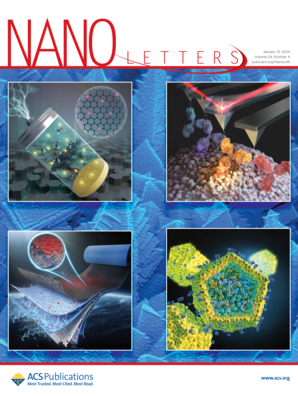Multilevel Nanoarray Spin-Orbit Torque Device for Process-in-Memory Applications.
IF 9.1
1区 材料科学
Q1 CHEMISTRY, MULTIDISCIPLINARY
引用次数: 0
Abstract
The advancement of data-driven technologies has increased energy and time consumption in data transfer between processors and memory units, limiting further improvement in device performance. This challenge can be addressed by introducing process-in-memory (PIM) architecture, which alleviates data transfer overhead through in-memory computation. In this work, we propose multilevel nanoarray spin-orbit torque (SOT) devices for PIM applications. In a Hall bar structure with multiple ferromagnetic islands, the SOT switching current varies depending on the size or shape of each island. Discrete multilevel states can then be precisely controlled by modulating input current, thus demonstrating analog PIM functionality. Furthermore, the same device also enables logic operations, with pulse currents as digital inputs and multilevel resistances as digital outputs, thereby demonstrating its suitability for digital PIM applications. Notably, multilevel SOT switching can operate with nanosecond current pulses, without requiring external magnetic field, highlighting its potential for ultrafast, energy-efficient PIM platforms.内存中进程应用的多能级纳米阵列自旋轨道转矩装置。
数据驱动技术的进步增加了处理器和存储单元之间数据传输的能量和时间消耗,限制了设备性能的进一步提高。这一挑战可以通过引入内存中的进程(PIM)体系结构来解决,该体系结构通过内存中的计算减轻了数据传输开销。在这项工作中,我们提出了用于PIM应用的多级纳米阵列自旋轨道扭矩(SOT)器件。在具有多个铁磁岛的霍尔棒结构中,SOT开关电流随每个岛的大小或形状而变化。然后可以通过调制输入电流来精确控制离散的多电平状态,从而展示模拟PIM功能。此外,同一器件还支持逻辑操作,脉冲电流作为数字输入,多电平电阻作为数字输出,从而证明其适用于数字PIM应用。值得注意的是,多电平SOT开关可以在纳秒级电流脉冲下工作,而不需要外部磁场,这凸显了其在超快、节能PIM平台上的潜力。
本文章由计算机程序翻译,如有差异,请以英文原文为准。
求助全文
约1分钟内获得全文
求助全文
来源期刊

Nano Letters
工程技术-材料科学:综合
CiteScore
16.80
自引率
2.80%
发文量
1182
审稿时长
1.4 months
期刊介绍:
Nano Letters serves as a dynamic platform for promptly disseminating original results in fundamental, applied, and emerging research across all facets of nanoscience and nanotechnology. A pivotal criterion for inclusion within Nano Letters is the convergence of at least two different areas or disciplines, ensuring a rich interdisciplinary scope. The journal is dedicated to fostering exploration in diverse areas, including:
- Experimental and theoretical findings on physical, chemical, and biological phenomena at the nanoscale
- Synthesis, characterization, and processing of organic, inorganic, polymer, and hybrid nanomaterials through physical, chemical, and biological methodologies
- Modeling and simulation of synthetic, assembly, and interaction processes
- Realization of integrated nanostructures and nano-engineered devices exhibiting advanced performance
- Applications of nanoscale materials in living and environmental systems
Nano Letters is committed to advancing and showcasing groundbreaking research that intersects various domains, fostering innovation and collaboration in the ever-evolving field of nanoscience and nanotechnology.
 求助内容:
求助内容: 应助结果提醒方式:
应助结果提醒方式:


